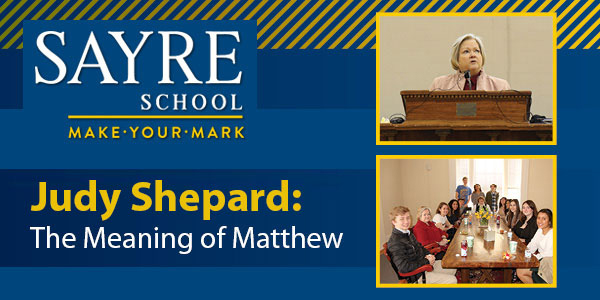Judy Shepard: The Meaning of Matthew
Mother of Wyoming Hate Crime Victim Brings Message of Tolerance to Sayre
Judy Shepard, whose son Matthew was murdered in a notorious hate crime in Wyoming 20-plus years ago, urged Sayre School students on Wednesday (March 12) to help create a world without hate, a world based on respect, understanding and empathy.
Matthew Shepard’s story sparked worldwide headlines and led to books, movies, TV shows and the award-winning play, “The Laramie Project,” which Sayre will stage March 15-17 at the Lexington Downtown Arts Center.
Directed by Sayre drama teacher Bo List and starring Sayre students, faculty and parents, the play will be performed Friday and Saturday at 7:30 p.m., and Sunday at 2 p.m.
Based on interviews with Laramie residents in the aftermath of the crime, the play chronicles a community in crisis. Last year, the play was performed 150 times in the U.S.
“I’m grateful for the play because it is life-changing,” Judy Shepard said.
Her visit to Sayre coincided with Founders Day that marks the 226th birthday of school founder David A. Sayre and included an address to the school’s Upper School students. She also visited the cast of “The Laramie Project.”
Eliciting insights from Shepard ranks as a matchless opportunity for cast members, according to List, who called Shepard an “internationally known civil rights activist.”
“Meeting her is like performing ‘Hamlet’ and spending an afternoon with Shakespeare,” he said. “This will make this performance more real on stage than anything they’ve done or will ever do again.”
In her 70-minute address to students, which included a Q-and-A session, Shepard, 66, recalled her son as an outgoing, loving person who never met a stranger. He loved the theater, performed on stage and also aspired to work in the U.S. foreign service.
He spent some of his high school years at a boarding school in Switzerland when the family moved to Saudi Arabia. His father, Dennis, worked in the oil industry.
Wyoming remains home for the Shepards, even though it ranks as one of the nation’s least diverse states – more than 90% of its half-million residents are white.
The state remains one of only five in the country without a hate crime law. That’s a cruel irony given the heinous circumstances of Matthew’s death.
On October 6, 1998 while a student at the University of Wyoming, he was savagely beaten by two men who left him to die tied to a fence in a remote area near Laramie. Six days later, he died.
After the assault, facts showed that the perpetrators, who are serving consecutive life sentences, attacked Mathew because he was gay.
His murder brought national and international attention to hate crime legislation. In 2009, President Barack Obama signed federal hate crime legislation, called the “Matthew Shepard Act.”
Last year, Shepard’s ashes were interred at the crypt of the Washington National Cathedral in a ceremony presided by Gene Robinson, the first openly gay Episcopal bishop.
Following her son’s murder, Judy, her husband and son, Logan, established the Matthew Shepard Foundation.
“Hate crimes are meant to terrorize,” Judy said. “They are meant to show hate against a community of people not just an individual.”
In 2009, Judy wrote “The Meaning of Matthew,” a memoir that traced the family’s journey through the prosecution of Matthew’s assailants, the ensuing media coverage and their continuing work to advance civil rights.
In the two decades since she lost her son, Judy has traveled the world spreading a message of tolerance and kindness.
“To be kind and tolerant, it’s not that complicated,” she told the Sayre crowd. “Hate groups have grown exponentially in the past three years, and that breaks my heart. My hope is that you don’t want to live in that kind of world.”
She encouraged Sayre students to promote respect and understanding, and reminded them that “you are in charge of what our country will become.
“Hate is a choice. Sexuality is not a choice. Race is not a choice. Hate takes people into a dark place.”
Asked by a student why she chooses to speak out, Judy explained that it was her form of grief.
“Loss is a hard thing and we all grieve in our own way,” she said, stopping to choke back tears.
“This is how I survived and it has given me reason to get out of bed in the morning. I also get to meet so many passionate and committed people.”
Shepard also addressed parents of LGBTQ children or children questioning their sexuality. She preached patience, saying that when Matthew came out to her when he was in college, she already knew.
“I didn’t bring it up with him because I thought he might retreat,” she said. “He had to do it when he was ready. You have to know your kid.”
Some children send out signals and it’s important for parents to tune in to those signs. She also recommended that parents create a welcoming, nonjudgmental household.
“There are so many ways you can show that you are supportive by the way you talk about things,” she said.
No matter what: Always embrace and accept your child, she said. The first thing she thought after Matthew died was: “I will never get a hug again.”
“It’s been 20 years since we lost Matt… and it feels like yesterday. It never gets better but it gets different. We move forward. We do this work because it honors Matthew.”

